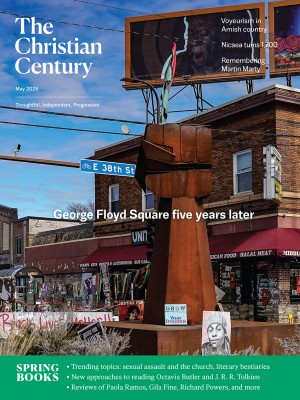May 29, Ascension C (Acts 1:1-11; Luke 24:44-53)
People who have died do not typically eat fish, nor expound upon the scriptures, nor stand among us to offer a blessing and then get whisked away into heaven.
When my niece and nephew were little, I improvised with the figures from a nativity set to introduce them to the adult Jesus. Joseph stood in for Jesus, while the shepherds and wise men were disciples or people seeking healing. Occasionally they filled in for Jesus’ opponents or members of the crowds. Mary played the roles of multiple women.
The children loved the stories about Jesus’ acts of healing and mercy, especially among people who “are sad or scared or maybe they don’t have a lot of friends,” as my niece said.
As I narrated the events around Jesus’ death and burial—the cross, the tomb, the huge stone—my niece began to cry and my nephew disappeared. From across the room I heard his quivering voice: “Then what happens?”
I told how the women go to the tomb and discover that it is empty. Jesus is not there! At this news, my nephew slowly emerged from behind the sofa. His head barely visible, he whispered, “Then what happens?”
Is it skepticism or is it hope that I heard in his little voice? I could not tell. Perhaps both.
“Well,” I said, “God doesn’t let Jesus stay dead!” Both children stared at me. There was a long pause.
My nephew leapt up from behind the sofa, astonished by this incredible turn of events. “You mean . . . he’s alive?!” Together both children shouted: “Then what happens?!”
I suspect the same question is on the hearts of the disciples who are with Jesus—and perhaps many today—as they begin to make sense of their extraordinary experience of Christ’s resurrection and ascension. To be sure, Jesus told them—more than once—that he would be raised from the dead. But it is hard to imagine how they could anticipate what that would be like.
Read our latest issue or browse back issues.
The once-dead do not typically eat fish, nor expound upon the scriptures, nor stand among us to offer a blessing and then get whisked away into heaven—do they?
Even after witnessing the power of God up close during those 40 days with the resurrected Jesus, the disciples are still unsure what will happen next.
After all, some things have not changed. Their lives are still constrained by powers over which they have very little control and rulers who do not have their interests at heart. Roman imperial policies and practices left too many people impoverished and vulnerable, many of them living on the outskirts of death. Too often, those in power were more than happy to eliminate anyone who might stir up a resistance, and plenty of people seemed glad to participate. Rome killed the Messiah with the crowds cheering along.
It is no wonder that the disciples hoped Jesus would secure political independence for their homeland by restoring the kingdom to Israel. He set them straight on that score, and now they must discern how to survive under the earthly powers of Rome while living according to the way of Jesus.
Many places in the world today face similar realities. As I write these words, shocking events unfold in the United States, as individuals holding governmental power pursue the demolition of institutions that provide a lifeline to many of the most vulnerable people in this country and abroad. Their actions threaten the lives of an increasingly long list of people, immigrants, people of color, women, LGBTQ people, the elderly, and those who are ill or suffering—not to mention thousands of people who are losing their livelihoods with little to no warning as programs and whole agencies are scrapped.
Powerlessness, anger, fear, confusion, uncertainty . . . these are feelings that circle the globe and span the millennia from our own day back to nearly every day in history.
God’s response is to live and die among us as Jesus and then to live again. A core element of the gospel proclaims that God’s strongest desire does not focus on siding with human wealth and power. Instead, God brings down the powerful from their thrones and lifts up the lowly, fills the hungry with good things and sends the rich away empty, and gives light to those who sit in darkness and in the shadow of death, to guide their feet into the way of peace.
The ascension of Jesus, following after his death and resurrection, represents God’s exclamation point on Jesus’ ministry among us. His earthly days are ended, but that is not the end. God is still God. Jesus is still raised from the dead. The resurrection power of the Spirit remains.
The Spirit’s power is poured out for Jesus’ followers, then and now. Power to testify to all that God has done. Power to pay attention to the world around us, in neighborhoods and in lands far away. Power to respond in love, to offer mercy, to forgive. Power to face the rich and powerful without fear. Power to affirm and put into practice Jesus’ mission to bring good news to the poor, to proclaim release to the captives and recovery of sight to the blind, to let the oppressed go free, to proclaim the year of the Lord’s favor.
As Jesus is lifted into the heavenly realm with God, the rest of us are invited and empowered to participate in God’s answer to the question, “Then what happens?” with the resounding confession, in word and action, “He’s alive!” Thanks be to God.





